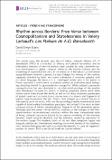Files in this item
Rhythm across borders : free verse between cosmopolitanism and statelessness in Valery Larbaud's Les Poésies de A. O. Barnabooth
Item metadata
| dc.contributor.author | Evans, David Elwyn | |
| dc.date.accessioned | 2019-11-01T15:30:08Z | |
| dc.date.available | 2019-11-01T15:30:08Z | |
| dc.date.issued | 2019-10-31 | |
| dc.identifier | 252051126 | |
| dc.identifier | 8b057873-dba0-40e7-8a85-0319f6fa4fb0 | |
| dc.identifier.citation | Evans , D E 2019 , ' Rhythm across borders : free verse between cosmopolitanism and statelessness in Valery Larbaud's Les Poésies de A. O. Barnabooth ' , Modern Languages Open , vol. 2019 , no. 1 , 8 , pp. 1-16 . https://doi.org/10.3828/mlo.v0i0.218 | en |
| dc.identifier.issn | 2052-5397 | |
| dc.identifier.other | ORCID: /0000-0001-7258-3485/work/64033750 | |
| dc.identifier.uri | https://hdl.handle.net/10023/18827 | |
| dc.description.abstract | This article reads the dynamic vers libre of Valery Larbaud’s Poésies d’A. O. Barnabooth (1913) as a rejection of literary and cultural nationalism, and an enthusiastic embrace of internationalism made possible by early twentieth-century developments in global transport networks, the tourism industry and the broadening of experiential horizons. In the character of Barnabooth, a sentimental young billionaire inclined to poetry, Larbaud indulges his fantasy of the rootless vagabond, stateless by birth, who roams unhindered. A voracious polyglot with no native language, Barnabooth is a translingual writer who in his poems in French expresses a commitment to transnationalism as multi-directional belonging, declaring himself ‘un grand patriote cosmopolite’. While Larbaud’s passionate cosmopolitanism has been dismissed as the dilettantish privilege of the wealthy elite, Barnabooth recounts his travels in striking polyphonic poems which allow diverse voices from around the world, as well as the noisy, dissonant soundscapes of global travel such as trains, boats, stormy seas, city streets and fragments of popular song to permeate the text. Poetic form emerges as a central feature of this opening up to the world, with vers libre providing a mobile, transnational verse capable of transcending tired national paradigms. Yet Larbaud’s free verse includes numerous echoes of former national glories: fragments of the alexandrine appear fleetingly amid the poems’ infinite rhythmic diversity, as the vestiges of late nineteenth-century nation-statehood resurface within this new, transnational mode of being. Larbaud’s innovative textual forms capture something of the interplay between fragile national identities and the transient, unsettling experience of the endless voyage. The rhythmic fabric of his vers libre juxtaposes regular and irregular, national and international, enacting the central tension of his statelessness, between belonging and rupture, in which Barnabooth, ‘ce coeur de vagabond’, pursues his dream: ‘Être un perpétuel évadé de tous les milieux’. | |
| dc.format.extent | 1293674 | |
| dc.language.iso | eng | |
| dc.relation.ispartof | Modern Languages Open | en |
| dc.subject | P Language and Literature | en |
| dc.subject | T-NDAS | en |
| dc.subject | BDC | en |
| dc.subject.lcc | P | en |
| dc.title | Rhythm across borders : free verse between cosmopolitanism and statelessness in Valery Larbaud's Les Poésies de A. O. Barnabooth | en |
| dc.type | Journal article | en |
| dc.contributor.institution | University of St Andrews. French | en |
| dc.contributor.institution | University of St Andrews. Office of the Principal | en |
| dc.contributor.institution | University of St Andrews. Centre for Poetic Innovation | en |
| dc.contributor.institution | University of St Andrews. Centre for Contemporary Art | en |
| dc.identifier.doi | 10.3828/mlo.v0i0.218 | |
| dc.description.status | Peer reviewed | en |
This item appears in the following Collection(s)
Items in the St Andrews Research Repository are protected by copyright, with all rights reserved, unless otherwise indicated.

